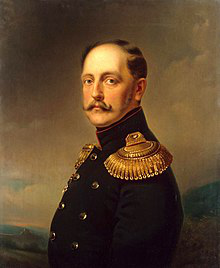

Emperor of all the Russias
6 July 1796 Gatchina Palace, Gatchina, Russian Empire
2 March 1855(1855-03-02) (58) Winter Palace, Saint Petersburg, Russian Empire
NamesNicholas Pavlovich Romanov
19th-century Emperor of Russia "Imperator Nikolai I" redirects here. For ships with this name, see Russian ship Imperator Nikolai I. Emperor of all the Russias Nicholas IPortrait by Georg von Bothmann, 1855Emperor of all the RussiasReign1 December 1825 – 2 March 1855 Coronation3 September 1826PredecessorAlexander ISuccessorAlexander IIBorn(1796-07-06 ) 6 July 1796 Gatchina Palace, Gatchina, Russian EmpireDied2 March 1855(1855-03-02) (aged 58) Winter Palace, Saint Petersburg, Russian EmpireBurialPeter and Paul Cathedral, St. Petersburg, Russian EmpireSpouseAlexandra Feodorovna (Charlotte of Prussia) (m. 1817 )Issue Alexander II of Russia Grand Duchess Maria Nikolaevna Queen Olga Nikolaevna, Queen Consort of Württemberg Grand Duchess Alexandra Grand Duke Konstantin Grand Duke Nicholas Grand Duke Michael NamesNicholas Pavlovich RomanovHouseHolstein-Gottorp-RomanovFatherPaul I of RussiaMotherMaria Feodorovna (Sophie Dorothea of Württemberg)ReligionRussian OrthodoxSignature Nicholas I (Russian: Николай I Павлович , tr. Nikolay I Pavlovich; 6 July 1796 – 2 March 1855) reigned as Emperor of Russia, King of Poland and Grand Duke of Finland from 1825 until 1855. He was the third son of Paul I and younger brother of his predecessor, Alexander I. Nicholas inherited his brother's throne despite the failed Decembrist revolt against him. He is mainly remembered in history as a reactionary whose controversial reign was marked by geographical expansion, economic growth and massive industrialisation on the one hand, and centralisation of administrative policies and repression of dissent on the other. Nicholas had a happy marriage that produced a large family; all of their seven children survived childhood. Nicholas' biographer Nicholas V. Riasanovsky said that he displayed determination, singleness of purpose, and an iron will, along with a powerful sense of duty and a dedication to very hard work. He saw himself as a soldier—a junior officer totally consumed by spit and polish. A handsome man, he was highly nervous and aggressive. Trained as an engineer, he was a stickler for minute detail. In his public persona, stated Riasanovsky, "Nicholas I came to represent autocracy personified: infinitely majestic, determined and powerful, hard as stone, and relentless as fate." Nicholas I was instrumental in helping to create an independent Greek state, and resumed the Russian conquest of the Caucasus by seizing Iğdır Province and the remainder of modern-day Armenia and Azerbaijan from Qajar Persia during the Russo-Persian War of 1826–1828. He ended the Russo-Turkish War (1828–29) successfully as well. Later on, however, he led Russia into the Crimean War (1853–1856), with disastrous results. Historians emphasize that his micromanagement of the armies hindered his generals, as did his misguided strategy. William C. Fuller notes that historians have frequently concluded that "the reign of Nicholas I was a catastrophic failure in both domestic and foreign policy." On the eve of his death, the Russian Empire reached its geographical zenith, spanning over 20 million square kilometers (7.7 million square miles), but had a desperate need for reform.

We use cookies
We use cookies and other tracking technologies to improve your browsing experience on our website, to show you personalized content and targeted ads, to analyze our website traffic, and to understand where our visitors are coming from. Privacy Policy.